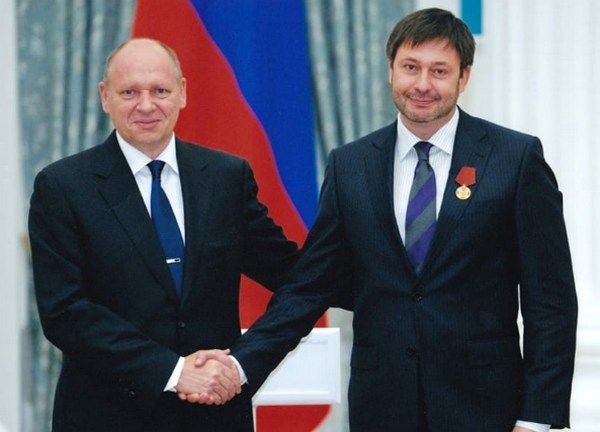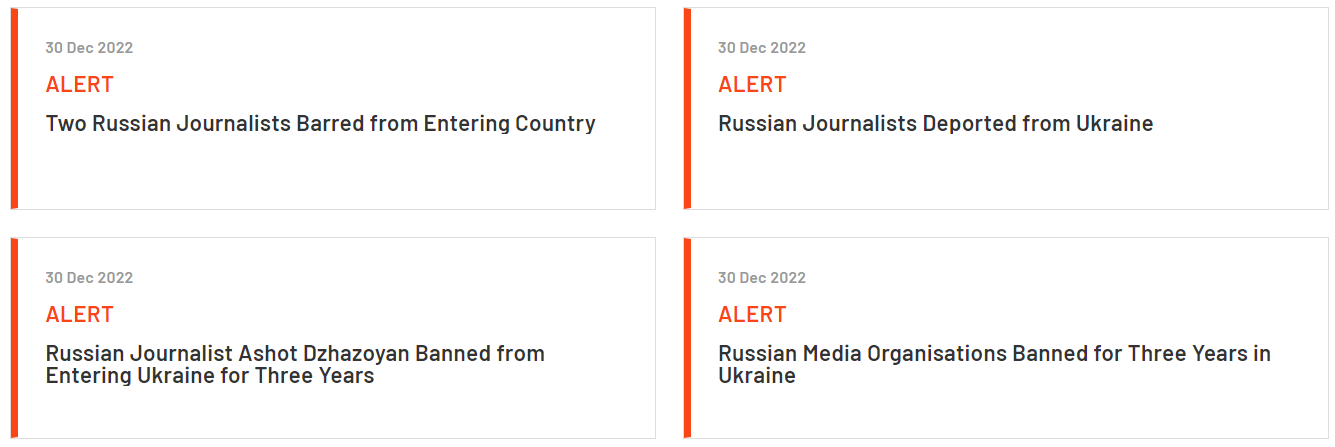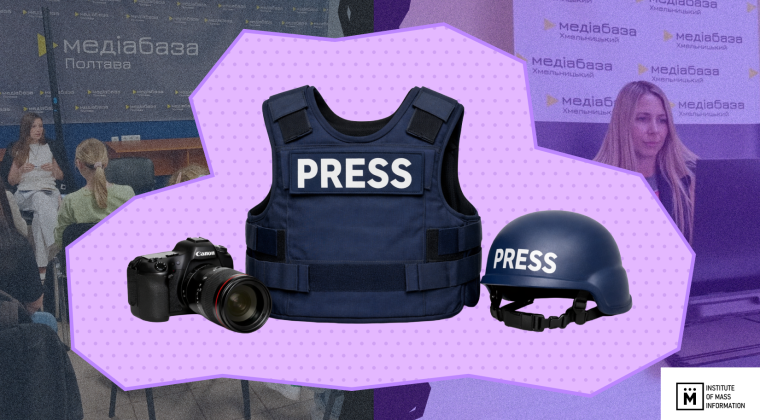Persecution, obstruction, death threats, kidnapping, unlawful imprisonment on false charges, murder, etc. – Russia and the armed groups affiliated with it have been committing a wide range of crimes against Ukrainian journalists since 2014. The number of Russia’s unlawful actions spiked following the full-scale invasion. Employees of foreign media have also fallen victim to Russia’s aggression.
Reporting on serious threats to journalists and press freedom in Europe falls to the Safety of Journalists Platform, created under the Council of Europe in 2015. More specifically, the alerts on the platform are posted by the chosen partner organisations. The goal, according to the platform, is to reinforce the Council of Europe’s response to the threats and member states’ accountability. In the event of a crime or a threat, the Platform may alert the national government of any of the 46 Council of Europe member states as well as Russia and Belarus, whose memberships have been revoked.
Since its creation, international media organisations and their Ukrainian partners have been using the Platform to post important messages to which the Ukrainian authorities would actively respond. Ukrainian civil society organisations have cited the Platform as a resource for defending freedom of speech and have themselves contacted their international partners to publish such messages.
However, the situation evolved overtime as the Platform’s response rates dropped rapidly. To reinstate the Platform to its former influence and credibility, changes must be made. The Institute of Mass Information emphasises: the current mechanism of distributing alerts between member states is unhelpful and requires substantial amendments. See, the Platform issues alerts to Ukraine over crimes committed… by the Russian Federation, namely in the temporarily occupied Crimea. Despite this, Ukraine’s national authorities are doing their best to respond to the numerous alerts such as these. As of August 21, 2023, Ukraine has provided no reply to five alerts, one of which concerns the murder of Ukrainian fixer Bohdan Bityk, who was killed by Russian shelling. As to the alerts addressing Russia, those have nothing to do with the Russian war crimes targeting Ukraine (media and journalists in particular) at all – they mostly concern the domestic crackdowns on freedom of speech. Why does this happen?
Moreover, the Platform sometimes hosts alerts which should not have been posted at all, as they are not about media or reporters, but… the Kremlin’s propaganda resources and their employees. For reference: Russia’s aggressive propaganda is one of the gravest threats to freedom of speech. Defending its resources and perpetrators means supporting Putin’s policy of crushing real mass media and oppressing journalists.
IMI studied the Safety of Journalists Platform and its guidelines on issuing alerts about threats to journalists and press freedom and prepared some recommendations with regards to the long overdue changes that must be made to the Platform.
The SJP working mechanism and the problem with alerts on threats to journalists and media
The Platform for the Protection of Journalism and Safety of Journalists was conceived as a means to “improve the protection of journalists, better address threats and violence against media professionals and foster early warning mechanisms” to prevent crime. The SJP Platform is supposed to alert the Council of Europe of press freedom violations in member states, with the organisation then proposing certain ways to address the situation.
The preparation of reports on the media situation in Europe and the alerting of national authorities is done by the Platform’s partners – international NGOs and associations of journalists invited to partake. On December 4, 2014, the Council of Europe and SJP’s Partner Organisations signed a Memorandum of Understanding. As of now, the Platform has 15 partners, including the European Federation of Journalists, “Reporters Without Borders”, the European Broadcasting Union, the International PEN Club, and the charity foundation Justice for Journalists, which was founded by the Russian politician Mikhail Khodorkovsky and his former business partner Leonid Nevzlin in 2018.
According to the SJP website, the Platform “allows the contributing partners to post alerts, subject to their own verification processes and standards.” This already raises some questions as to whether the alerts are distributed objectively. The Platform, which is essentially a joint base of alerts on threats and violations against journalists and the media, should be regulated by a set of unified standards, not left to the discretion of 15 organisations each of which has an approach of its own.
To be fair, the Platform does advise partners to adhere to certain requirements when submitting information. In particular, the information should be reliable, based on facts and already in the public domain or published upon consent. Article 4 of the Memorandum of Understanding between the Council of Europe and SJP’s partners says that the CE will not edit the information submitted by the partners, but may remove posts that do not meet the requirements. It is unclear how exactly the Platform vets its partner organisations’ adherence to the aforementioned criteria and what penalties there are for deliberate or accidental violations of the guidelines on posting information which will then be used to issue alerts to national authorities of member countries. With this article, the Institute of Mass Information addresses the Council’s Platform and asks for an explanation.
The lack of overarching verification rules and unified standards results in alerts on “repression” of propagandists, not on crimes against journalists or violations of their rights, being sometimes posted on the Platform. For instance, in May 2018, SJP posted an alert to the Ukrainian government over the detention of “RIA Novosti” office manager Kirill Vyshinsky on treason charges. We remind you that in 2018, the Security Service of Ukraine exposed a network of Russia-backed media organisations used by the aggressor state in the hybrid information war against Ukraine. During a search, the SBU discovered Vyshinsky’s Russian passport, which he had received in 2015; Mr Vishynsky also has an award from the Russian government – a medal for “returning” Crimea.

Vyshinsky being awarded for his service to Russia by Alexey Gromov, first deputy of the Russian Presidential Administration chairman
Vyshinsky was handed over to Russia in a “35 for 35” prisoner swap between Ukraine and the RF on September 7, 2019, and resumed his work in propaganda. In October 2019 Kirill released his propaganda show “The People of the Donbas”, where he alleges that 2014 marked the start of a “civil war” in Ukraine. After February 24, 2022, he continued to legitimise the Moscow-backed armed groups “DPR” and “LPR” and has made trips to the temporarily occupied territories in violation of Ukraine’s law. Vyshinsky is currently the executive director at the federal propaganda agency “Rossiya Segodnya”.
The Vyshinsky alert to Ukraine was labelled “resolved” no sooner than December 30, 2022: the partner organisations “concluded it was no longer an active threat to media freedom.” Still, the alert has never been updated to mention Vyshinsky’s current employment in supporting Russia’s armed aggression or his ties to the Kremlin. As we see, this alert should not have been posted in the first place, as it does not meet the Platform’s own requirements which partners must supposedly adhere to while submitting information.
IMI is asking the Council of Europe for an explanation as to why the alert has not been taken down from the website, seeing as the information listed in it concerns no threat to press freedom and is misleading in that it calls a propagandist who has been working for years to provide a rationale for Russia’s full-scale invasion of Ukraine and facilitate the Russian occupation of Crimea, Sevastopol and parts of Donetsk and Luhansk oblasts a “journalist”.
Besides the Vyshinsky case, the Safety of Journalists Platform hosts a whole array of alerts where partner organisations see bans on Russian propagandists and Moscow’s “pocket” resources as violation of freedom of speech in Ukraine.
For instance, in May 2018 the partner organisations EFJ/IFJ, CPJ and Index issued an alert to Ukraine over a ban on several Russian propaganda resources, including “RIA Novosti”, Sputnik and “Vesti”. The decision was labelled as an act that has chilling effects on media freedom, and the Ukrainian state was listed as the source of threat. In August 2017, the partner organisations EFJ/IFJ, Index and the RSF were concerned over Ukraine deporting Anna Kurbatova (“Perviy Kanal”) and Tamara Nersesyan (VGTRK) for spreading the Kremlin’s propaganda. The list of such alerts equating propagandists with journalists goes on.
Russian crimes against media: conveniently ignoring the real culprit?
Following February 24, 2022, the Platform’s website started posting alerts to Ukraine concerning the Russian propagandists who were injured in combat areas, consistently referring to them as “journalists”. In July 2022, the Platform’s partner organisations, the aforementioned CPJ, EFJ/IFJ and Article 19, issued an alert to Ukraine over, quote, “attacks on physical safety and integrity of journalists.” Specifically, it was about the Russian propagandist, pro-Kremlin “TV Centre” employee Andrei Alekseyev being injured by shrapnel in temporarily occupied Donetsk. The propagandists blamed the shelling on the Ukrainian forces. Alerting Ukraine over Alekseyev’s injury is manipulative. First, the annotation never mentions that “TV Centre” promotes aggressive Ukrainophobic ideas, facilitates the Russian occupation and assists the war effort. Nor that Alekseyev was in Ukraine’s temporarily occupied territories in violation of the Ukrainian law and the border-crossing procedure with the intention not of reporting, but propagandising on the Kremlin’s orders. Second, we would like to stress that regardless of who was doing the shelling, had it not been for Russia’s invasion and the work of pro-Kremlin media, there would have been no hostilities on Ukraine’s land at all.
Sadly, the Safety of Journalists Platform continues to use incorrect terminology in its alerts when it comes to Russia’s war on Ukraine. Namely, by calling the pro-Russian insurgents… “separatists”. This is utterly inaccurate, as there is no political group in Ukraine that wishes to secede a part of Ukraine’s territory and establish a new, fully independent state there. There are, however, accomplices to the Russian invaders who act on their orders and whose goal is for Russia to absorb Ukraine in full or in part. This is evidenced, at the very least, by Russia officially amending its Constitution to annex the illegally occupied Ukrainian territories. What kind of separatism is that? We call on international organisations to be considerate with their terminology and suggest they look through the glossary of correct terminology related to Russia’s war on Ukraine, which was prepared by the Center of Strategic Communications in partnership with the Institute of Mass Information (available in Ukrainian and English).
Let us go back to the alert distribution mechanism, though. The Institute of Mass Information emphasises that the Safety of Journalists Platform issues alerts to Ukraine with regards to… Russia’s crimes against Ukrainian and foreign reporters and media, including the crimes committed in Ukraine and Ukraine’s temporarily occupied territories. None of such alerts are addressed to Russia. IMI considers this situation to be unjust and unacceptable.
For instance, the Platform hosts alerts to Ukraine (!) about the journalists imprisoned by Russia in the temporarily occupied Crimea and those that ended up behind bars after the start of Russia’s aggression against Ukraine. In December 2019, CPJ and EFJ/IFJ alerted Ukraine (!) over Russia sentencing the Crimean Tatar journalist Nariman Memedeminov to 2,5 years in prison on false charges of terrorism. The case and the unlawful ruling was approved by the Russian Southern District Military Court in Rostov-on-Don. Nariman himself has stressed that the case brought against him is an act of persecution due to his religion and profession, which aims to suppress his active citizenship and the truth about what is happening on the peninsula.
Furthermore, Ukraine has received an alert over Russia unlawfully convicting Crimeans for membership in Hizb ut-Tahrir – an organisation that is legal in Ukraine, but has been proclaimed “terroristic” in Russia.
After the start of the full-scale invasion Ukraine has been alerted over Russia’s numerous war crimes against Ukraine. It is Ukraine that is listed in the case of Iryna Danylovych, who was unlawfully sentenced to nearly 7 years behind bars and even moved to a prison in Russia. The alert on the reporter Dmytro Khyliuk, who has been a Russian captive since early March, is also addressed to Ukraine, not to the aggressor – Russia. So is the alert on the journalist Iryna Levchenko, who was kidnapped in occupied Melitopol in May 2023. Finally, the Ukrainian authorities must for some reason answer for the murders of multiple reporters from international and Ukrainian media outlets, which were committed by Russia. For example, the Ukrainian fixer Bohdan Bityk was killed by Russian snipers.
IMI is asking the Platform to explain the rationale behind alerting Ukraine on Russia’s crimes against the media while issuing no alerts to Russia over the violations it commits. We also believe it necessary to stress that nowhere on the Platform’s website or in the Council of Europe’s Memorandum is it written that alerts to this or that country are issued based on the location where the crimes occurred. So even if a crime or a threat to the safety of journalists or media freedom is recorded in a place that is de jure in Ukraine, the alert should be issued to the perpetrator state – Russia. We hope that the Platform’s goal is to justly punish the attackers and to hold them accountable, not to issue merely formal alerts by territory without ever addressing the real aggressor. It should also be taken into account that Ukrainian law enforcers can not access the temporarily occupied territories to take “protective or remedial action” as required by the Platform. It is Russia which must answer for the crimes and threats it perpetrates in Ukraine. It is Russia which is the aggressor and has been consistently undermining efforts to defend the rights of journalists and freedom of speech by Ukraine and international organisations alike.
The danger of incorrect alert distribution
The Institute of Mass Information calls on the Safety of Journalists Platform to distribute and label the alerts on violations and threats to the media properly.
Issuing false alerts may cause the idea of accountability to become blurred, as it is the victim, not the aggressor, that is being blamed for the crime. This makes it impossible to develop an effective strategy to address the threat. Moreover, it makes the Platform itself irrelevant, as it shows that, instead of building a safe environment for reporting, a helpful initiative has transformed into pure bureaucracy which merely asks Ukraine’s national authorities for a formal response to the crimes they have no complicity in – such as opening cases against the Russian aggressors. Ukraine hardly needs extra persuasion to do that: as of today, the Ukrainian police have registered over 71 thousand war crimes committed by Russia. On our part, the Institute of Mass Information has recorded 524 crimes against the media and journalists which were committed by Russia.
IMI’s recommendations on the necessary changes to the Platform
The Institute of Mass Information calls on the Council of Europe and the SJP partner organisations:
- To thoroughly vet the information on persons and entities mentioned in alerts. To develop and release unified and transparent standards of posting and verifying the information based on which the Platform’s partners issue alerts to states. A way to vet the information submitted by partners in-house or a practice of only posting alerts upon reaching a consensus among SJP partners should be introduced to prevent misleading information and, consequently, false alerts from being posted.
- In the event of a misleading alert having been posted on the Platform, it will be fair not just to take some of the information down from the website, but also to notify the Platform’s users of the mistake, post an apology and explain the changes made to the alert.
- Alerts of crimes committed by the Russian army and the armed groups affiliated with it should be addressed to the Russian state, not to Ukraine. Same applies to alerts concerning threats to journalists in combat areas, as the combat is caused by Russia’s armed aggression as well. This should also be the guiding principle when it comes to recording violations and threats in the temporarily occupied parts of Ukraine, including Crimea and Sevastopol. After all, the Ukrainian authorities and law enforcers have no means of exercising effective control over these territories (which the Platform itself admits). The crimes against journalists committed by Russia in Ukraine and filed as Ukraine’s responsibility on the Platform must be reviewed and re-assigned to the aggressor state.
- To develop a stance regarding propagandists and pro-Kremlin resources and to stop equating them with journalists and media. To remember that those are a grave threat to freedom of speech in and of themselves. This principle should also apply to coverage of frontline events. Foreign and Ukrainian journalists are risking their lives in combat areas to fulfil their reporting duty. Russian propagandists, however, are war criminals and accomplices in the armed aggression, as they have been promoting enmity towards Ukrainians, justifying the war and Putin’s crimes, and calling for the extermination of Ukraine for years. That is, if employees of Russian propaganda outlets, say, come under fire in a combat area, having arrived there in violation of Ukrainian law, such an incident can not be posted on the Platform, as it has nothing to do with journalists and everything to do with participants to the armed aggression.
- To introduce correct labelling of alerts that would show which ones are still relevant and which have already been “resolved”. For example, alerts can be highlighted in different colours in the “Related Content” section on every state’s “home page”. As it stands now, all alerts in the overall list are marked red even though some of them are no longer relevant. One can only learn the status of a case by viewing every alert individually: the resolved cases are marked green there. The lack of clear labelling may mislead some of the Platform’s users into making assumptions based on the overall list of alerts alone. Furthermore, in some cases this might be outright dangerous and play into Russia’s aggressive propaganda.
To better explain our suggestions, we will take the alerts on the screenshot as an example:

All of these alerts were posted on the Safety of Journalists Platform before the start of Russia’s full-scale invasion. Yet, in the overall list they are labelled as December 2022. One may assume that, despite the escalation of Russian aggression, the Platform is alerting Ukraine… for barring Russian propagandists from entering the country, expelling them or banning Russian propaganda resources. In reality, however, the alerts are listed under December 2022 because that was when they were labelled “resolved” and updated.
Yet, this does not negate the fact that these alerts should never have been listed on the Safety of Journalists Platform in the first place, as they are about propagandists and the Kremlin’s media, which the partner organisations, alas, fail to mention.
***
The Institute of Mass Information asks the Safety of Journalists Platform to explain the faulty alert distribution and to provide a response to the suggested recommendations.



